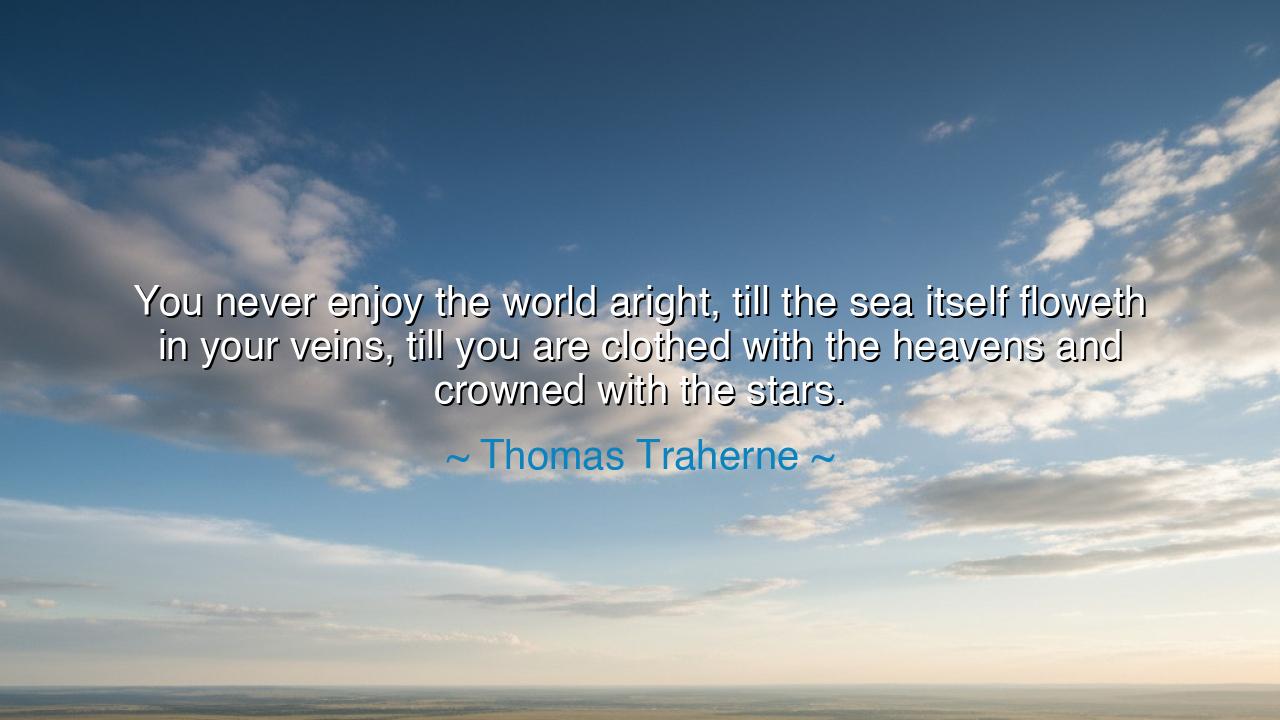
You never enjoy the world aright, till the sea itself floweth in
You never enjoy the world aright, till the sea itself floweth in your veins, till you are clothed with the heavens and crowned with the stars.






In the vast expanse of the world, where the land meets the sky and the oceans stretch endlessly toward the horizon, there lies a truth about how we experience the world. The great Thomas Traherne, in his wisdom, spoke of a profound connection to the world around us: "You never enjoy the world aright, till the sea itself floweth in your veins, till you are clothed with the heavens and crowned with the stars." These words are not mere poetic musings, but a powerful invitation to experience the world in its deepest, most sacred form. They speak to the idea that true joy and understanding come not from observing the world from a distance, but from becoming one with it—immersed in the natural forces of the earth and the cosmos.
The ancients spoke often of the deep connection between humanity and the natural world. The Greeks, for example, believed in the interconnectedness of all things, seeing the gods not as separate from nature but as embodiments of its forces. Zeus, the king of the gods, wielded thunder and lightning, elements that were not just natural phenomena but forces of divine power. The ancient Stoics, like Epictetus and Marcus Aurelius, taught that by embracing nature, by understanding its rhythms, and by aligning ourselves with its truths, we find a sense of peace and purpose. Traherne’s quote mirrors this ancient wisdom, suggesting that to truly enjoy the world, one must embrace the elemental forces around them—just as the sea must fill the sailor’s veins, and the stars must crown the visionary.
The sea, in Traherne’s words, is not merely an expanse of water, but a symbol of life itself—a force that is both powerful and serene, mysterious and yet essential. The ancient mariners understood this well. Consider the story of Hernán Cortés, who sailed across the vast Atlantic to conquer lands unknown, guided by the stars and the pulse of the sea. His journey was one not just of conquest, but of connection to the deep forces that ruled the oceans—the winds, the tides, the stars, and the very vessel that carried him forward. Cortés did not merely observe the sea; he became part of it, just as every sailor who embarks on such a journey must surrender themselves to the vastness of the ocean, allowing it to flow within them. This is the essence of what Traherne speaks of: to truly experience the world, we must immerse ourselves fully in it, to be shaped and moved by its forces.
The heavens and the stars that Traherne speaks of represent the higher truths of the universe—those divine forces that govern not just the physical world, but the very fabric of existence. The ancients also understood the importance of aligning oneself with the heavens. The Maya people, for example, built great observatories to track the stars and the movements of the planets, believing that these celestial bodies held the keys to understanding their destiny. The philosophers of Greece and Rome—like Pythagoras—saw the heavens not just as the realm of the gods, but as a reflection of the order of the universe. To be “clothed with the heavens and crowned with the stars” is to align oneself with that divine order, to live in harmony with the cosmos, and to see the world through the eyes of the divine.
In the modern age, we are often disconnected from these elemental forces that the ancients revered. We live in cities made of steel and stone, and we have traded the expansive horizons of the ocean for the confines of our daily routines. Yet, Traherne’s call to immerse ourselves in the world around us is still as relevant as ever. To truly live in this world, we must reconnect with nature, with the forces of earth, sea, and sky, just as the ancient explorers did. We must remember that the sea is not just a body of water, but a reminder of the flow of life itself—always moving, always changing, yet forever present. Similarly, the stars are not just distant lights, but guides, offering direction, wisdom, and clarity to those who look up to them with reverence.
The lesson here is both simple and profound: to truly experience the world, to truly live, we must immerse ourselves in the natural world around us. Just as the mariner becomes one with the sea, and the sailor looks to the heavens for guidance, so too must we embrace the elemental forces of nature—the earth beneath our feet, the water that sustains us, and the stars above that guide us. In doing so, we open ourselves to a deeper understanding of the world and a deeper connection to the divine forces that shape our existence. To live fully is not to observe from a distance but to be immersed in the world, to be shaped by its rhythms, and to see ourselves as part of the great cosmic dance.
So, dear listener, let us follow the wisdom of Traherne. Let us open our hearts and our minds to the natural world, letting it fill our veins like the sea, and let us look to the heavens above, letting the stars crown our efforts and guide our journey. For it is only when we embrace the world in its totality—when we allow the elements to flow through us—that we can truly experience the joy and wonder of living. The world is not a distant, separate thing to be studied from afar; it is a living, breathing part of who we are. And in understanding it, we find our true purpose and our deepest connection to the universe.






AAdministratorAdministrator
Welcome, honored guests. Please leave a comment, we will respond soon